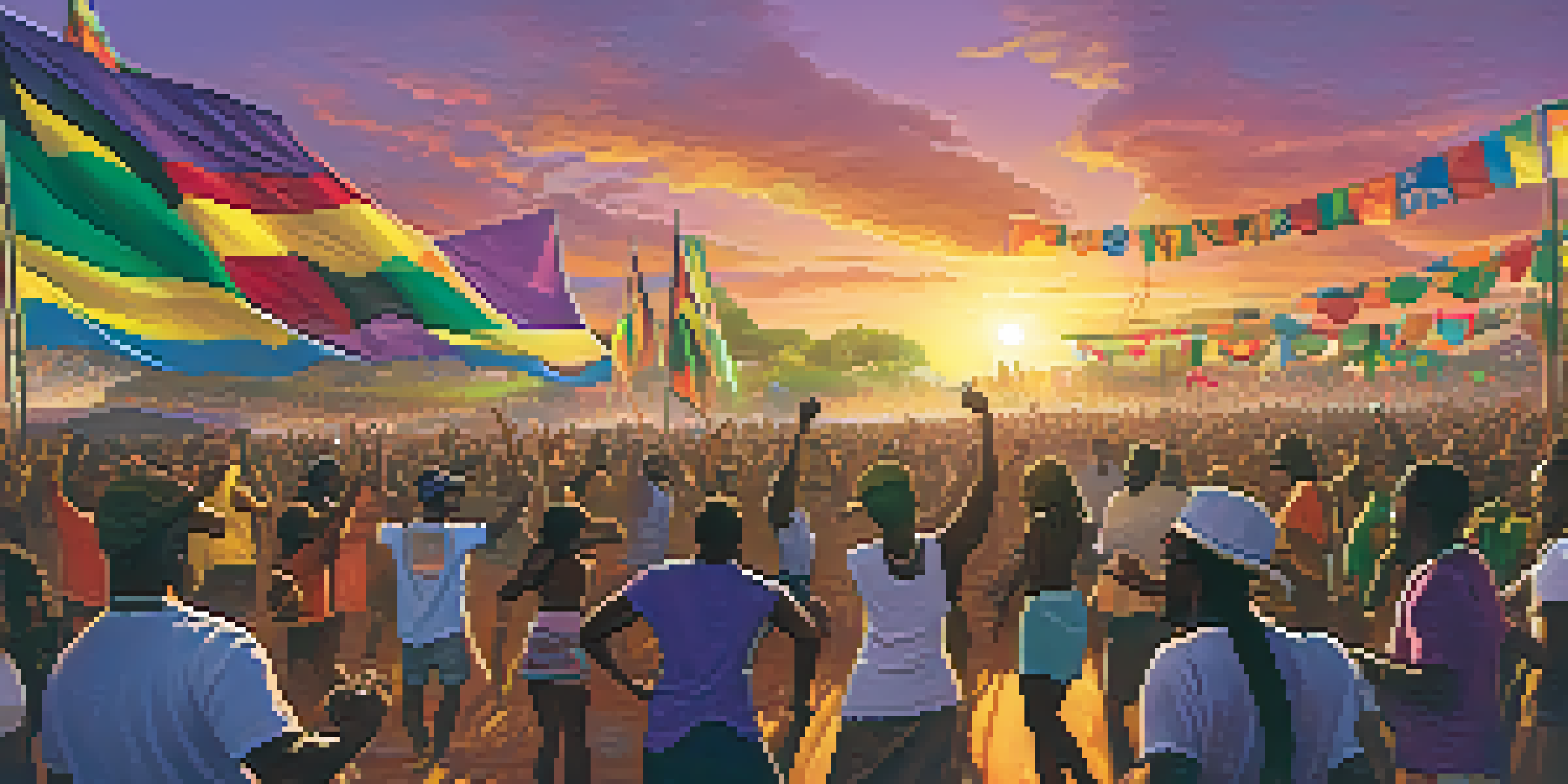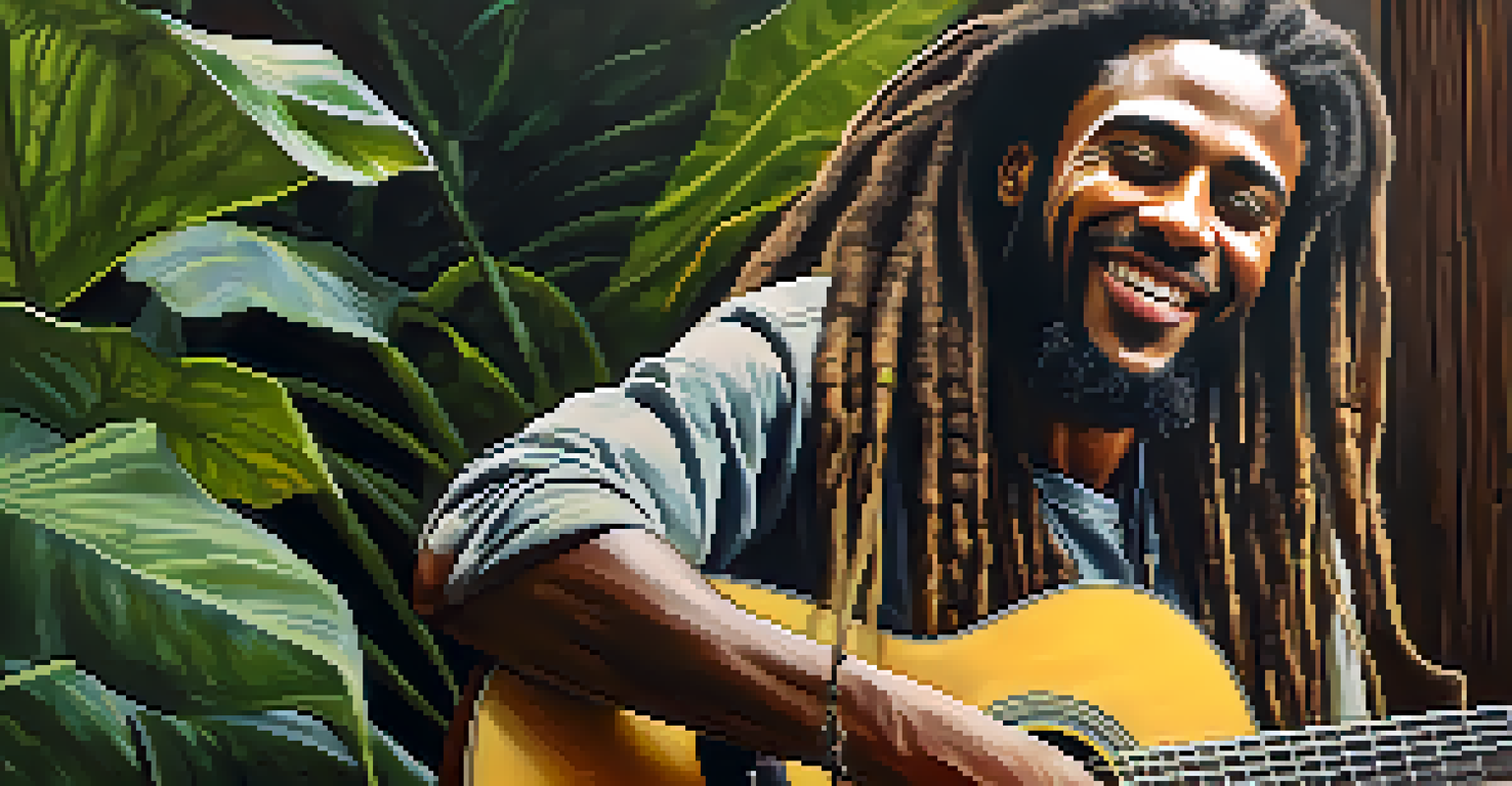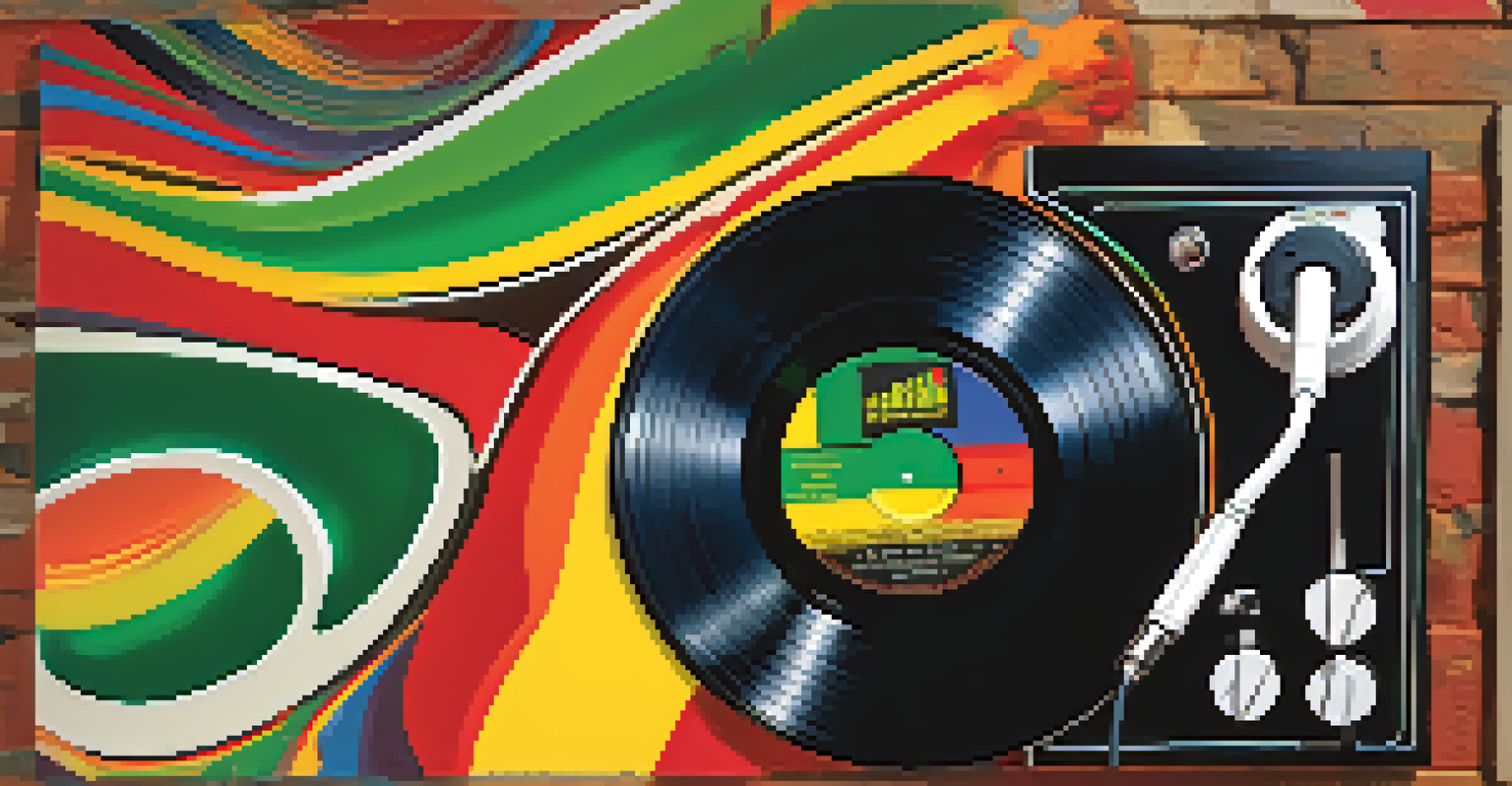The Influence of Reggae on Global Music Culture

Reggae's Origins: A Peek into Jamaican Roots
Reggae music originated in Jamaica during the late 1960s, emerging from earlier genres like ska and rocksteady. This unique blend of rhythm, melody, and socially conscious lyrics quickly captured the hearts of many. It provided a voice for the marginalized and became a powerful tool for expressing cultural identity and political statements.
One good thing about music, when it hits you, you feel no pain.
The sound of reggae is characterized by its offbeat rhythm, which creates a laid-back feel that contrasts with the often serious themes in its lyrics. This musical style not only reflects the struggles and joys of Jamaican life but also resonates with listeners around the globe. The influence of reggae can be traced back to its roots in Rastafarian culture, which promotes messages of peace, love, and resistance.
As reggae gained popularity, it began to evolve, leading to various sub-genres like dancehall and dub. Each of these styles carried forward the essence of reggae while introducing new elements, further enriching the global music landscape.
Cultural Resonance: Reggae’s Global Message
Reggae music is not just about the beats; it's also about the messages it conveys. Themes of love, unity, and social justice resonate deeply across cultures, making it relatable to people from all walks of life. This universality is what allowed reggae to transcend its Jamaican roots and find a home in many different countries.

Artists like Bob Marley, Peter Tosh, and Jimmy Cliff have played pivotal roles in spreading reggae's message of hope and resilience. Marley's 'One Love' is a perfect example of how reggae embodies the spirit of togetherness, encouraging listeners to embrace peace and harmony. The global appeal of such songs has led to reggae becoming a symbol of resistance against oppression.
Reggae's Roots in Jamaican Culture
Reggae music emerged in Jamaica during the late 1960s, evolving from ska and rocksteady to become a powerful voice for cultural identity and social issues.
As reggae music traveled beyond Jamaica, it influenced various genres worldwide. From hip-hop to rock, elements of reggae can be found in countless songs, proving its ability to connect with diverse audiences and inspire new musical movements.
Iconic Artists: Shaping Reggae's Legacy
The impact of reggae would not be what it is today without its iconic artists. Bob Marley, often regarded as the face of reggae, brought the genre to mainstream audiences with his powerful lyrics and infectious rhythms. His songs continue to inspire generations, making him a global ambassador for reggae music.
The music is a universal language and we are all part of it.
Other artists like Peter Tosh and Bunny Wailer contributed significantly to the genre's evolution, each adding their unique flair and perspective. Tosh's activism and bold sound, for instance, challenged social norms and encouraged listeners to think critically about their surroundings. This diversity among artists has helped reggae remain relevant and dynamic.
Moreover, contemporary reggae artists like Protoje and Koffee are blending traditional elements with modern sounds, ensuring the genre's growth. This ongoing evolution keeps reggae fresh and appealing, allowing it to resonate with younger audiences while honoring its roots.
Reggae Festivals: Celebrating Global Unity
Reggae music festivals have become a popular phenomenon worldwide, drawing thousands of fans eager to celebrate and connect. Events like Reggae Sumfest in Jamaica and Rototom Sunsplash in Spain showcase not only established artists but also emerging talent from various backgrounds. These festivals create a vibrant atmosphere where people can share their love for reggae.
Such gatherings provide a platform for cultural exchange, as attendees from different countries come together to enjoy the music and learn about Jamaican culture. The sense of community fostered at these festivals highlights reggae's ability to unite people, regardless of their origins. It's a powerful reminder of music's role as a universal language.
Global Impact of Reggae Music
Reggae transcended its Jamaican origins, resonating with diverse audiences worldwide through themes of love, unity, and social justice.
Additionally, these festivals often include workshops and discussions on topics related to reggae's history and social messages. This educational aspect helps attendees gain a deeper understanding of the genre and its significance, further solidifying reggae's place in global music culture.
Reggae's Influence on Modern Music Genres
The influence of reggae extends far beyond its own genre, shaping various modern music styles. Elements of reggae can be heard in hip-hop, pop, and even electronic music, demonstrating its versatility and appeal. Artists like Rihanna and Sean Paul have successfully blended reggae rhythms with contemporary pop sounds, creating chart-topping hits that keep reggae's spirit alive.
In hip-hop, many artists incorporate reggae samples and styles to add depth to their music. The laid-back rhythms and socially conscious lyrics often mirror the themes found in reggae, creating a seamless fusion that resonates with fans. This cross-genre collaboration is a testament to reggae's lasting impact on the music industry.
Moreover, reggae's influence can also be seen in the rise of genres like reggaeton, which combines reggae's rhythmic elements with Latin influences. This innovative blend has made reggaeton a global sensation, further proving reggae's ability to adapt and thrive in an ever-changing musical landscape.
Social Movements: Reggae as a Voice for Change
Reggae music has long been intertwined with social and political movements, serving as a powerful voice for change. Many reggae artists have used their platforms to address issues like inequality, violence, and environmental concerns. This commitment to activism has helped raise awareness and inspire action among listeners worldwide.
For instance, Bob Marley's 'Get Up, Stand Up' is an anthem for resistance, urging people to stand up for their rights. Such songs have played a crucial role in motivating social movements, becoming rallying cries for those fighting against oppression. The ability of reggae to inspire collective action is one of its most significant contributions to global culture.
Reggae's Evolution and Future
The genre continues to evolve as artists blend traditional reggae with contemporary styles, ensuring its relevance and connection with new generations.
Furthermore, reggae has often been associated with the Rastafarian movement, which promotes messages of peace, love, and respect for all humanity. This cultural connection has helped reggae maintain its relevance as a voice for change, encouraging listeners to reflect on their values and take a stand for what they believe in.
The Future of Reggae: Evolution and Innovation
As we look toward the future, reggae music continues to evolve while staying true to its roots. New artists and producers are experimenting with different sounds and styles, ensuring that reggae remains fresh and relevant. This spirit of innovation is essential for the genre's longevity, allowing it to attract new listeners while retaining its loyal fanbase.
Collaborations between reggae artists and musicians from other genres are becoming increasingly common, resulting in exciting new sounds. This blending of styles not only showcases reggae's versatility but also highlights its adaptability in a rapidly changing music landscape. The fusion of reggae with genres like hip-hop, pop, and electronic music opens up new avenues for creativity.

Ultimately, the future of reggae lies in its ability to inspire and connect people across the globe. As long as artists continue to share their stories and messages through this beloved genre, reggae will remain a vital part of the global music culture, uniting audiences with its powerful rhythms and heartfelt lyrics.